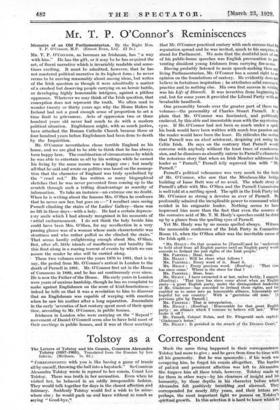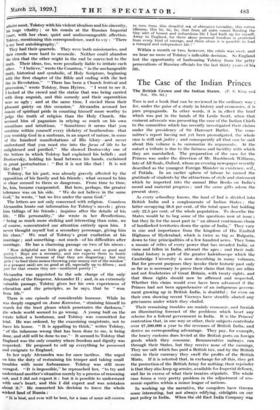Tolstoy as a
Correspondent
4 CORRESPONDING with you is like havirig a game of tennis' all by oneself, throwing the ball into a haystack." So Countess Alexandra Tolstoy wrote in reproof to her cousin, Count Leo Tolstoy. There was truth in her accusation. Even when he visited her, he behaved in an oddly, irresponsible faihion. They would talk together for days in the closest affection and intiniacy. Suddenly Tolstoy would feel a wish to be smile- where else ; he would pack up and leave without is:, much as saying " Good-bye."!-
.
, Much the same thing happened in their correspondence, Tolstoy had more to give ; and he gave, from time to time:with all his generosity. But he was spasmodic ; if his work was occupying him, he forgot his cousin altogether. The Iiurden of patient and persistent affection was left to Alexandra. She forgave him all these trials, however. Tolstoy made up for, them in other ways—by his clearness of insight sad his humanity, by thoie , depths in his character hefOre which Alexandra felt positively trembling and alanried, TheY corresponded for nearly ,fifty years, and their letters are, perhaps, the most important light we possess on ,Toistoy's
spiritual growth. In this selection it is hard to know; which to , .
admire most, Tolstoy with his violent idealism and his sincerity, his huge vitality ; or his cousin at the Russian Imperial
Court, with her clear, quiet and undiseourageable affection.
Tolstoy, mentioning this correspondence, used to sly : "There is my best autobiography."
They had their quarrels. They were both missionaries, and their creeds were hard to reconcile. Neither could abandon the idea that the other might in the end be converted to the truth. Their ideas, too, were peculiarly liable to irritate each other. " I believe," wrote the Countess, " in the unchangeable truth, historical and symbolic, of Holy Scripture, beginning with the first chapter of the Bible and ending with the last line in Revelation." " There has been a Church festival and procession," wrote Tolstoy, from llyeres. " I went to see it. I looked at the Crowd and the statue that was being carried with deep anguish, and this comedy and their superstition were so ugly ; and at the same time, I envied them their
pleasant gaiety on this occasion." Alexandra accused her cousin of spiritual pride in counting himself more worthy to judge the truth of religion than the Holy Church. She accused him of paganisin in relying so much on his own
sensations and intuitions. " Sometimes it seems that you combine 'within yourself every idolatry of heathendom—that you worship God in a sunbeam, in an aspect of nature, in some of the himdred Manifeitations of His Glory—and never understand that you must rise into the focus of life to be enlightened and ptirified." She showed 'Dostoevsky one of the letters in which Tolstoy had explained his beliefs ; and Dostoevsky, holding his head between his hands, exclaimed in great perturbation : " But it is not like that ! It is not like that 1 " TOIstoy, for his part,' was already gravely affected by the opposition of his family and his friends ; what seemed to KIM so clear seemed to them so dangeroui. From time to time, he, too, became exasperated. But here, perhaps, the greater tolerance was on his side. " We do not believe in the same God," he wrote, " but we live under the same God."
The letters are not only concernedwith religion. Countess Alexandra hunts out information for Tolstoy's novels ; gives him tidings of his friends ; inqUires after the details of his life. " His perionality," she wrote in her Recollections, being so much more striking and interesting than mine, we of course, concentrated our attention entirely upon him. I never thought myself but a secondary personage, giving him his clues." We read of Tolstoy's great exaltation at his marriage ; and something—not much—of his difficulties after marriage. He has a charming Passage on two of his nieces :
" How delightful are little girls at that age, and so good and pretty ! Boys are a necessity, and one expects them to bestir themselves, and because of that they are disgusting ; but tiny girls (` to feed them means throwing your money out of the window ' as a peasant said) are no good at-all, especially up to fifteen ; and just for that reason they are—undiluted poetry ! '
•
Alexandra was appointed to the sole charge of the only daughter of the Emperor, Alexander H ; and, in an extremely valuable passage, Tolstoy gives her his own experiences of education and the principles, as he says, that he " won from life."
There is one episode of eonsiderabie humour. While he was deeplY engaged on Anna Karenino, " straining himself to search for the least gleam which penetrates the darkness," the whole world seemed to go wrong. A young bull on the estate killed a herdsman, and Tolstoy was committed for trial. He was ordered, by the examining magistrate, not to leave his house. " It is appalling to think," writes Tolstoy, " of the infamous wrong that has been done to me, is being done, and still will be done to me." • It seemed to Tolstoy that England was the only country where freedom and dignity was respected; He proposed to sell up everything he possessed and emigrate to England.
In her reply Alexandra was for once tactless. She urged on him the duty of restraining his temper and taking small troubles with more forbearance. Tcils-toy was still more enraged. " It is impossible," he reproached her, "to try and understand anther's situation merely by a process of reasoning out, and I did not expect it : but it is possible to understand with one's heart, and this I - did expect and was mistaken about it." He reasserted his decision to leave the whole
wicked land of Russia : '
" It is best, and ever will be best, 'for a Man of Some self-esteem
to turn from, this dreadful sea of obtrusive triviality, this rotten idleness, this lie, lie, lie, that from all .sideS comes flooding the tiny islet of honest and industrious life I had built up for myself. Away to England, for there alone personal freedom is protected from every land of outrage, and there alone it is possible to lead a tranquil and independent life ! "
Within a month or two, however, the crisis was over, and we hear no more of Tolstoy's inflexible decision. So England lost the opportunity of harbouring Tolstoy from the petty
persecutions of Russian officials for the last thirty years of his life.

















































 Previous page
Previous page